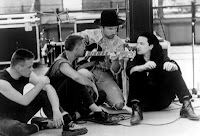These days, the pomposity of U2 is well-known and taken for granted, and anyone who can't stand Bono's grand pronouncements and self-importance probably stopped listening to the band a long time ago. But in 1988, as The Joshua Tree had just made the band into international superstars, the idea that they took themselves way too seriously was just starting to take hold, and the documentary Rattle and Hum confirmed for many people that the band members were insufferably full of themselves. Bono's onstage posturing and the band's sort of smug exploration of American roots music come off as rather mild compared to the bombastic performances and projects the band would be involved with later on, and Rattle and Hum features some great concert footage that captures the band at the height of its fiery idealism.
It's pretty disjointed as a movie, though, with director Phil Joanou awkwardly splitting between a straightforward concert documentary (as in the late-film series of songs taken from a concert at Sun Devil Stadium in Arizona) and a chronicle of the band's dabbling in Americana. The Sun Devil Stadium sequence especially often seems like it comes from a different conception of the movie, with the full-color footage breaking in after most of the running time has proceeded in black and white. And while the earlier parts of the movie focus on new songs (such as recordings made at Sun Studios or the B.B. King collaboration "When Love Comes to Town") or covers or reworkings of existing songs (like the gospel-choir take on "I Still Haven't Found What I'm Looking For"), the later segment features the band performing recognizable hits.
While it may be odd to see a concert movie focused on material that audiences haven't heard already, Rattle and Hum is more effective when it shows the band exploring new ground. Sure, they come off as narcissistic and out of touch while touring Graceland (where Bono promises they won't film drummer Larry Mullen Jr. sitting on Elvis' motorcycle, and then they do just that), but at least the movie is offering up a candid portrait of the band's evolution. The concert footage is fine for what it is, but Joanou and the band seem uncertain of what kind of statement they want to make with the movie, and the result is a mix of compelling, embarrassing and ambitious material that doesn't really fit together very well. In that way, it's a pretty accurate indication of what U2 would become.



No comments:
Post a Comment